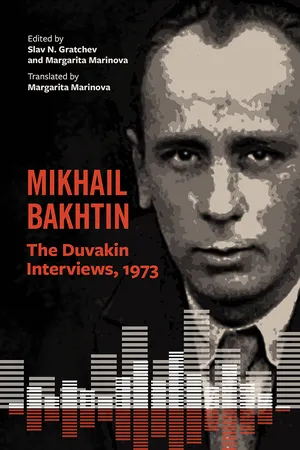![]()
Interview Two
March 1, 1973
Length of the interview: 167 minutes
DUVAKIN: Well, Mikhail Mikhailovich, we ended our conversation last Thursday talking about Odessa. We had to stop there. You were talking about the vulgarity of the locals. Would you like to finish with that, perhaps? The people of Odessa are not all unrefined, right? After all, there are some decent people among them …
BAKHTIN: Yes, of course, there are.
D: There’s the Odessa Theater … 1
B: I think we talked about that last time. The Odessa Theater was wonderful. Back then they always seemed to host visiting troupes, from our leading theaters, and also from various European countries. Always. In that respect the people of Odessa knew Western European art as well as the northerners, or perhaps even better!
D: Better than the citizens of Moscow and Petersburg. Were you able to hear any of the important singers who came to Odessa?
B: Of course I did, of course I did. It’s just that I can’t remember right now if I saw them perform there, in Odessa, or somewhere else, later. Let’s see, I heard Chaliapin there.2 But the first time I listened to him was before Odessa. In Vilnius. He came there.
D: Let’s move to the next period in your life then: Petersburg.
B: OK. Maybe I can start by telling you about the movement, the circle formed in Petersburg back in 1911–12.
D: Was it already there when you arrived?
B: Yes, it was in full swing. I had already visited them before I moved to Petersburg.… Once I relocated there, I joined their circle. Its leader was my brother, Nikolay Mikhailovich Bakhtin. The circle, by the way, didn’t have a rigid organization. There was no formal membership. It was a group of friends, similar to Pushkin’s circle: they were people connected through common interests and the university, which they all either attended then or used to attend in the past; they were all close friends. The circle was called “Omphalos.”
D: What does that mean?
B: It means “belly button,” “omphalos.”
D: From the Greek?
B: Yes, Greek. I should mention that most participants in the circle were classicists. Yes, classicists. There were also a few Romano-Germanists. Now, let’s see, who was there? As I said, my brother Nikolay was the leader. Then … Lev Pumpyansky, who had known me and my brother since our days at the gymnasium. Another member was … Lopatto,3 but I forgot his first name and patronymic. He was then a linguist and had just finished his studies at the philology department. He studied linguistics, and later joined OPOYAZ, though he didn’t play a major role there, and his name is usually not even mentioned in connection with it. Lopatto was also a poet, but, we should note, not an important one. In 1914, or maybe it was a little later, in 1915, he published a collection of poems. I must say it was not very good. He was not a serious poet.
Let me turn next to what our circle was about, what set us apart. Lopatto was a poet, but also a literary scholar. He published several articles inspired by the early ideas of OPOYAZ. Then following the October Revolution … he stayed for the first few years, but then left. He was very rich, let me tell you. His father, right before the Revolution, had bought the famous “London” Hotel in Odessa. He was very wealthy, a millionaire, even multimillionaire.
D: Lopatto was raking it in.4
B: Raking it, very true. Yes, yes. [he chuckles] In addition, he also married (in 1916, or … that’s correct, 1916) a very rich woman, with a huge dowry, so that added to his immense wealth too. This is why, as far as I know, he is still alive and well to this day in Italy. He had a house, a proper palazzo in Florence, bought before the Revolution.
D: What is interesting about him as far as cultural contributions go?
B: He was interesting for this reason: because he had extremely broad interests and was very social, which helped unite the people around him. Well, it helped in the sense that he always had money, while most of us were pretty poor.
Other participants in the circle included the brothers Radlov, Sergey, and Nikolay. Sergey is the future film director, but at the time he was just a linguist, and nobody would have guessed he’d become a director later. He was a young scholar-linguist. His brother, Nikolay, was an artist. Not a bad one at that, and a master caricaturist. But that wasn’t the main thing for him. There were also many other members of the circle, whose names I might be able to remember later, but my memory is not what it used to be. Not at all.
So what was the circle about? They were learned jesters, pranksters, or clowns of scholarship, if you will. But we know from history that this is a pretty typical phenomenon. For example, in Poland, there was the so-called “szubrawiec” circle.… They, too, were highly educated scholars who got together to write humorous texts, mainly parodies, etc.
D: When was that?
B: The “szubrawiec krzyżówka”5 existed at the beginning of the nineteenth century. We should note that our baron Brambeus-Senkovsky came from that circle.6 He belonged to that group back in Poland, before he moved to Russia for good. There were similar societies in other countries, say, in England. There they also had a circle of people who specialized, so to speak, in mockery and ...
